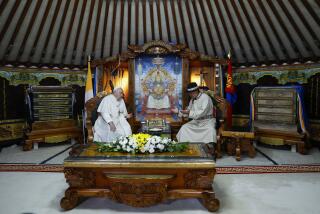Pontiff Arrives in Kazakhstan
- Share via
ASTANA, Kazakhstan — Pope John Paul II, venturing to the edge of a potential global conflict zone, landed in Central Asia on Saturday with appeals for pacifism and religious tolerance. The leader of this largely Muslim nation welcomed him as a voice of reason in the crisis following terrorist strikes in the United States.
John Paul did not mention the Sept. 11 attacks on the World Trade Center and Pentagon or the U.S. military buildup to hit back at an Islamist-inspired terror network presumably based in Afghanistan.
But in a speech at the airport, he said that “controversies must be resolved not by recourse to arms but by the peaceful means of negotiation and dialogue.”
The Roman Catholic leader brushed aside concerns about his safety after the terrorist attacks and went ahead with the long-planned trip, which will also take him to Armenia. His Kazakh hosts embraced the ailing 81-year-old pontiff with what they called their country’s biggest security operation ever.
Thousands of black-bereted riot police lined the main streets of Astana, the capital, and stood every 50 feet along the papal motorcade route. An armored personnel carrier carrying snipers in black masks guarded a memorial as John Paul laid a wreath and prayed for the hundreds of thousands who died in Stalin-era labor camps in this former Soviet republic.
President Nursultan A. Nazarbayev thanked the pope for coming despite “the troubled situation in the world” and for having stressed, in his initial condemnation of the slaughter in America, that Islam should not be blamed for it.
“The tragedy that happened in the United States presents a threat of division and confrontation between civilizations and religions,” Nazarbayev told the pope in his welcoming remarks.
Leaders of all five former Soviet republics in Central Asia have voiced alarm over the rise of Islamic militants, many of whom are believed to have been trained in Afghanistan. Nazarbayev predicted last year that Afghanistan’s Taliban regime and Osama bin Laden, the prime suspect in the U.S. attacks, would soon target Kazakhstan. Last week, Nazarbayev joined other Central Asian leaders in offering support for a U.S. military campaign against Islamic extremism in the region.
The Kazakh leader had lobbied for a papal visit as part of an effort to keep peace in this multiethnic country and open it to Western influences. About half of Kazakhstan’s 16.7 million people are Muslims; about 7 million are Orthodox Christians and about 180,000 are Roman Catholics, most of them descendants of German, Polish and Ukrainian prisoners exiled by Soviet dictator Josef Stalin to labor camps on the harsh Kazakh steppes.
Noting these “sad events of the 20th century,” the pope urged Kazakhs to safeguard the religious freedom gained with independence from Moscow 10 years ago. Religious tension is relatively low here, although Roman Catholic leaders often complain of bureaucratic obstacles in getting visas for foreign priests and legally registering their parishes.
“When citizens accept one another in their respective religious beliefs,” the pope said, “it is easier to foster the recognition of other human rights and an understanding of the values on which a peaceful and productive coexistence is based.”
The pontiff, huddled in red robes in the evening chill, spoke slowly in Russian, in a trembling voice and often short of breath. He wore a hearing aid and looked more stooped than usual.
John Paul is not generally viewed as an enemy by the Muslim world. He is the only pope to have entered a mosque. He has supported Palestinian demands for statehood and has criticized the U.S.-led bombings and embargoes hurting the civilian populations of Iraq and Libya.
Even so, his presence in Central Asia after the Sept. 11 carnage aroused concern for his safety. Philippine police say Islamic militant Ramzi Ahmed Yousef, the convicted mastermind of the 1993 bombing of the World Trade Center, had planned to kill John Paul during a visit to Manila in 1995.
“There wasn’t a debate on whether the pope should go, although the security issue was raised,” said papal spokesman Joaquin Navarro-Valls. “The decision was left to John Paul.”
Navarro denied reports that the Vatican had asked for or received assurances from Washington that U.S. forces would hold off a counterattack during John Paul’s six-day journey.
More to Read
Sign up for Essential California
The most important California stories and recommendations in your inbox every morning.
You may occasionally receive promotional content from the Los Angeles Times.













